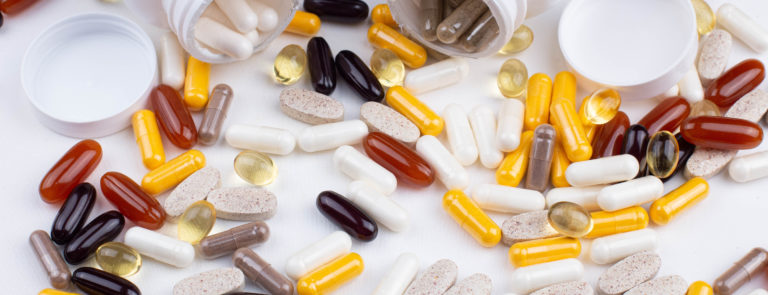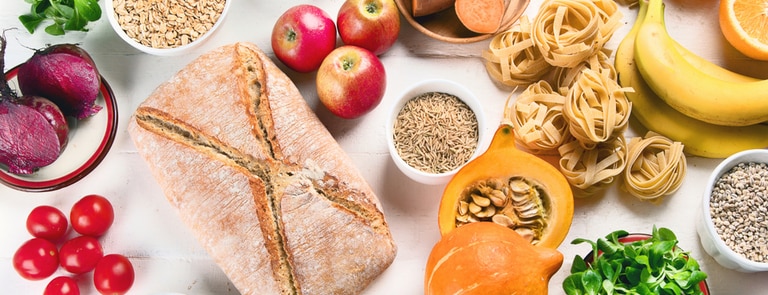10% off £35
Can you have too much Vitamin D?

Regardless of the season, a daily dose of vitamin D is always important in staying healthy.
Vitamin D’s main job is to regulate our calcium and phosphate levels, which keep our bones, teeth, and muscles healthy. A vitamin D deficiency can result in some people developing bone deformities - so it’s only natural to want to top up.
But is it possible to have too much Vitamin D?
Skip to:
Where do we get Vitamin D from?
You can find it in some food, but this isn’t the primary source of vitamin D.
We get most of what we need from the sun. Sunlight acts on chemicals under the skin and helps turn them into vitamin D.
Unfortunately, getting enough vitamin D daily can sometimes be pretty difficult in the UK…
Wearing an SPF product (which is highly recommended to protect our skin from the sun’s harmful UV rays) can also affect our body’s ability to absorb vitamin D. It’s still recommended that you use an SPF product of 30 or higher every day, though - no matter the weather.
It’s also widely reported that it can take people with darker skin longer to boost their vitamin D levels in the sunshine.¹ The main reason for this is that the pigment (melanin) in dark skin does not absorb as much UV radiation.²
How much vitamin D do we need?
According to the latest NHS guidance, adults and children over the age of one need 10μg (micrograms) of vitamin D per day.³
They recommend that everyone takes a daily 10μg supplement between October and March.
This applies to everybody, including people at risk of having a vitamin D deficiency and those who are pregnant or breastfeeding.
Babies under 1 year require a little less; they need 8.5-10μg of vitamin D per day.
Handpicked content: 12 of the best vitamin D supplements
Calculating vitamin D levels
When looking at supplements, the UK guidance is in micrograms (μg). But a lot of the labels refer to IU (International Unit), which can be a bit confusing. To help you out, it’s worth remembering that one IU of vitamin D is equivalent to 0.025 micrograms. So you’ll need to divide by 40 to go from IU to μg. Or you can use this table:⁴
| IU | How to calculate | MCG |
| 400IU | Divide by 40 | 10mcg |
| 600IU | Divide by 40 | 15mcg |
| 800IU | Divide by 40 | 20mcg |
| 1000IU | Divide by 40 | 25mcg |
| 2000IU | Divide by 40 | 50mcg |
Vitamin D intake upper level guidance
To help prevent toxicity, it’s advisable to follow the upper intake levels. You shouldn’t consume any more vitamin D than this per day:⁵
| Age | Intake (IU) |
| 0-6 months | 1000 |
| 7-12 months | 1500 |
| 1-3 years | 2500 |
| 4-8 years | 3000 |
| 9+ years | 4000 |
Can you overdose on Vitamin D?
We all need enough Vitamin D - but it is possible to have too much of a good thing.
Luckily, it’s almost impossible to get excessive vitamin D from your diet or from sunlight.³
Food sources can only deliver a limited amount of the vitamin, and your body is great at regulating its own vitamin D. Any extra produced by exposure to sunshine is stored in your body fat.
Many people turn to taking vitamin D supplements, especially in the winter months when they feel they are not getting enough exposure to sunlight.
For most of us, this is great - a huge 1 in 5 of us in the UK have low vitamin D levels.⁶
However, it is possible to have too much vitamin D, so you should always be responsible when taking supplements.
The most extreme levels of overdosing on Vitamin D in supplement form is called hypervitaminosis D.
Vitamin D side effects
Vitamin D toxicity can lead to a build-up of calcium in your blood (hypercalcemia), which can cause:
- Nausea, vomiting, and stomach pain
- Weakness
- Frequent urination
In some cases, excessive vitamin D can also cause bone pain and kidney problems, such as the formation of calcium stones.
This is because a high level of vitamin D in the body can also raise your calcium levels. Too much calcium can make you urinate too much, which in turn makes the body lose too much water.⁷
In some cases, this could cause the kidneys to calcify (form calcium deposits). If these deposits become particularly large, they could interfere with the way your kidneys function.
Toxicity is rare, but it could be serious. But it is easy to avoid: be aware of your supplement’s dose, and only take the recommended daily amount.
The latest Government guidelines from Public Health England suggest 10 micrograms (400 IU) of vitamin D for adults and children aged 12+ months.⁸
If you stay within these guidelines, you are unlikely to experience any side effects from vitamin D. The only warning to this would be if your body lacks the ability to absorb or utilise vitamin D.
Summary:
- It is highly unlikely that you can overdose on vitamin D via sunlight or diet
- It is possible to take too many supplements containing vitamin D, so always follow the dose guidelines
What are the risks of taking too much vitamin D?
If you take too much vitamin D from a supplement (or from large doses of cod liver oil), you are at risk of high levels of calcium in your blood.
The medical term for this is hypercalcemia, which could result in nausea and constipation.
It could also affect your mental capacity, leaving you feeling fuzzy-headed and confused. In extreme cases, it could lead to kidney stones.
What happens if you have an allergic reaction to vitamin D?
Some people might be allergic to synthetic forms of vitamin D. These can include calciferol, ergocalciferol, cholecalciferol and calcitriol.
You can’t be allergic to vitamin D in its natural form - only when you take it through supplements. Allergies to synthetic vitamin D are rare (affecting approximately 1 in 300 people), but it’s best to look out and consult your GP before taking any new vitamins.⁹
You might be having an allergic reaction if you’ve taken any of the above and:
- You’re having difficulty breathing
- Your face and hands are swollen, itchy, or have come up in hives
- You’ve got a rash on your skin
- Your tongue or lips are swollen
- You’ve got a headache
- You’re experiencing bone pain
- Your urine is cloudy
- Your heart is beating abnormally (arrythmia), or
- You’ve got an upset stomach¹⁰
If you think you’re having an allergic reaction to your vitamin D supplements, seek medical care immediately.
Be confident in your vitamin D dosage
Choose a vitamin D supplement that is clearly labelled with information you understand.
Do not exceed the recommended daily dose. Take a look at our vitamin D supplements for a daily dose you can trust.
Finally, it’s best to speak to your GP before beginning any new vitamins or supplements, as they’ll know what’s healthy for you.
Last updated: 1 September 2022
The advice in this article is for information only and should not replace medical care. Please check with your GP or healthcare professional before trying any supplements, treatments or remedies. Food supplements must not be used as a substitute for a varied and balanced diet and a healthy lifestyle.
Before taking any supplements or minerals, it’s best to make sure you’re getting all the nutrients through your diet first.
Food supplements must not be used as a substitute for a varied and balanced diet and a healthy lifestyle.
Sources
- https://newsnetwork.mayoclinic.org/discussion/mayo-clinic-q-and-a-how-much-vitamin-d-do-i-need/
- https://www.sunsmart.com.au/uv-sun-protection/how-much-sun-is-enough
- https://www.nhs.uk/conditions/vitamins-and-minerals/vitamin-d/
- https://www.healthline.com/nutrition/how-to-increase-vitamin-d#7.-Try-a-UV-lamp
- https://www.news-medical.net/health/Vitamin-D-Overdose.aspx
- https://patient.info/bones-joints-muscles/osteoporosis-leaflet/vitamin-d-deficiency
- https://www.ncbi.nlm.nih.gov/pmc/articles/PMC7969500/
- https://www.gov.uk/government/publications/vitamin-d-supplementation-during-winter-phe-and-nice-statement
- https://vitamindwiki.com/Overview+Rare+Allergic+reaction+to+vitamin+D
- https://www.livestrong.com/article/485109-is-face-swelling-an-allergic-reaction-to-vitamin-d/














